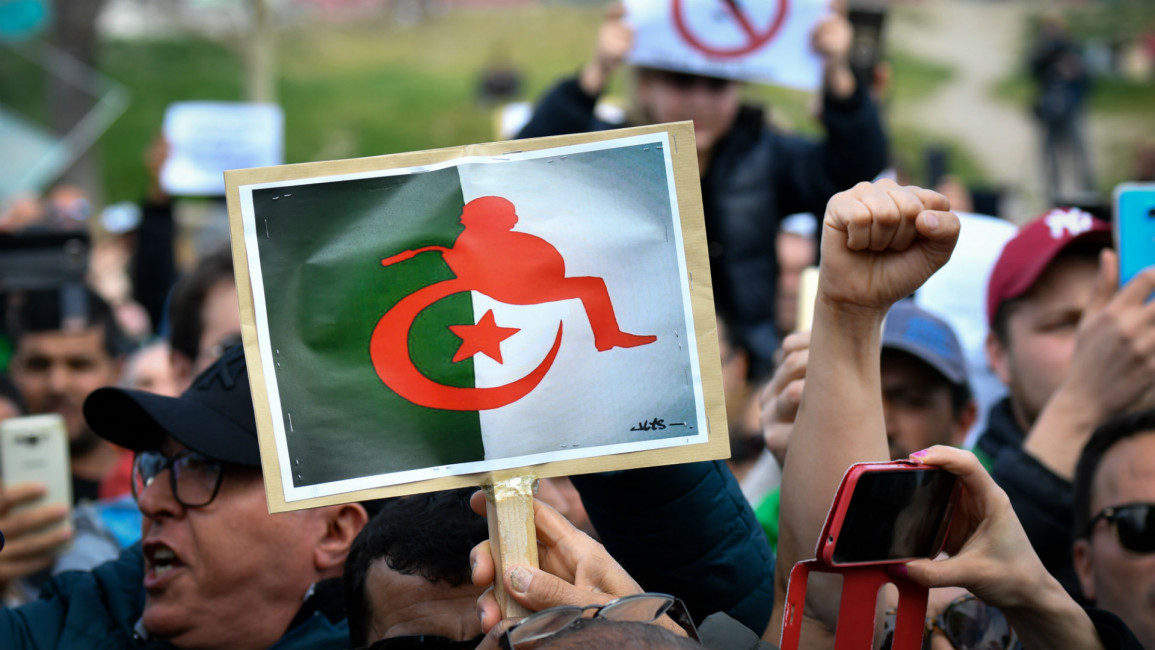Algerians protest Bouteflika bid for fifth term on deadline day
Hundreds of people staged new protests Sunday in the Algerian capital and other cities against a fifth term for ailing President Abdelaziz Bouteflika as he faced a midnight deadline to register for April elections.
Chanting "Bouteflika go away", protesters rallied near the main city centre campus of the University of Algiers, cordoned off by police, AFP journalists said.
Hundreds more students held rallies at campuses across Algiers, including at the Faculty of Law near the headquarters of the Constitutional Council.
Police fired water cannon to prevent protesters from reaching the Council, where candidates must register for the presidential race, security sources said.
Rallies inside and outside campuses in the northeastern city of Annaba also drew hundreds chanting "anti-Bouteflika" slogans, a local journalist said on condition of anonymity.
The TSA news website reported other protests in Algeria's second and third cities, Oran and Constantine, as well as in Bouira, Skida and Gelma in the east and Tiaret and Mostaganem in the southwest.
Bouteflika's announcement in February that he would seek another five-year term despite his failing health has unleashed angry protests.
In France, Algeria's former colonial power, at least 2,000 people joined anti-Bouteflika rallies in Paris and other cities.
"Out out," shouted crowds in central Paris, where protesters waved placards and some wrapped themselves in Algerian flags.
Bouteflika, who uses a wheelchair and has rarely been seen in public since a 2013 stroke, has remained silent on the demonstrations since they broke out last month.
The 82-year-old flew to Switzerland on February 24 for what his office described as "routine medical checks".
The presidency has not detailed when he will return from the Geneva hospital, which was calm when AFP visited on Sunday.
Protesters to be 'disappointed'
On Saturday, Bouteflika sacked his campaign manager Abdelmalek Sellal, a former premier who successfully oversaw the president's past three re-election bids, state media said, without giving a reason.
Sellal was removed ahead of a deadline of midnight (2300 GMT) Sunday for contenders to register for the April 18 election, and replaced by Transport Minister Abdelghani Zaalene.
There are no legal requirements for candidates to be physically present to submit their bid to the Constitutional Council. In 2014, Bouteflika registered in person.
Six candidates have already registered, including prominent retired general Ali Ghediri, who was the first to announce he would run for the presidency calling it a "major challenge" and promising a "change".
Businessman Rachid Nekkaz, who has cultivated a mass following among young people, said he would follow suit.
An editorial Sunday in El-Moudjahid newspaper, a mouthpiece of the government, said protesters would be "disappointed" in their campaign to force Bouteflika to pull out of the election race.
The sacking of Sellal came after more than a week of demonstrations by Algerians, including lawyers and students, in Algiers, where protests have officially been banned since 2001, and other cities.
The first major protest drew tens of thousands on February 22 with demonstrators chanting "No fifth mandate".
The scale of the protests has surprised many in Algeria and represents the biggest challenge in years to the authorities.
Tear gas and stones
On Friday, clashes erupted between police and protesters in Algiers as tens of thousands of people took to the streets.
Riot police used tear gas and batons to keep some protesters from marching on the Government Palace which houses the prime minister's office.
According to a police toll, 56 police officers and seven demonstrators were hurt and 45 alleged stone-throwers were arrested in Algiers.
Bouteflika has been in power for two decades, gaining respect from many for his role in ending a civil war in the 1990s that officials say killed nearly 200,000 people.
Officials have warned that the protests risk dragging Algeria into instability, comparing the rallies to those that sparked Syria's war.
Protesters have been mobilised by calls on social media which have resonated with young Algerians, many of whom struggle to find jobs in a country where half the population is under 30.
Reporters at state radio have complained that their bosses have imposed a blackout on coverage of the demonstrations, and last week journalists also took to the streets to protest against alleged censorship.
Agencies contributed to this report.
Follow us on Twitter: @The_NewArab



